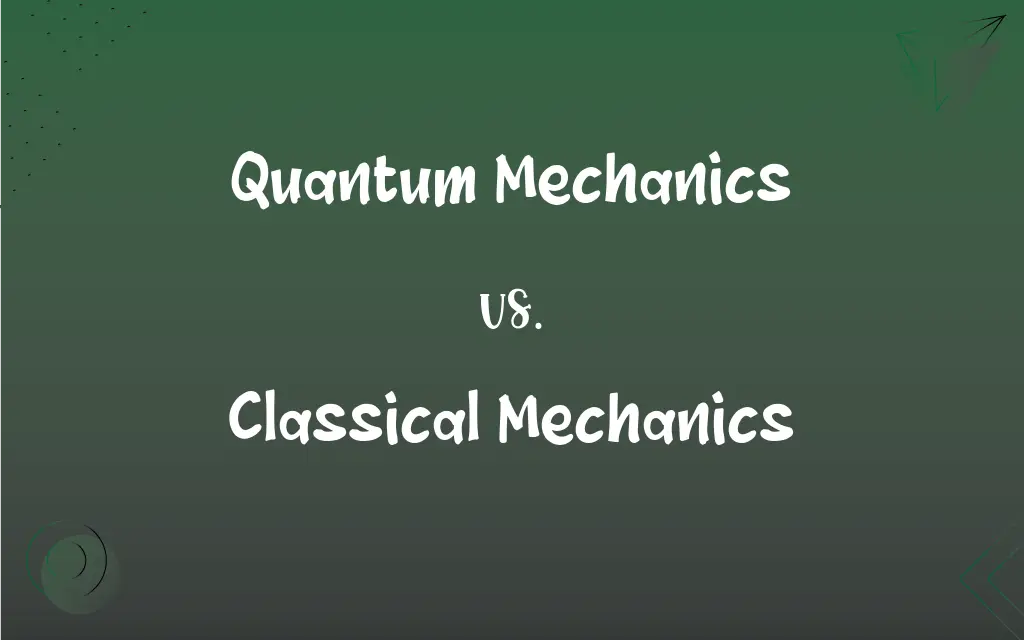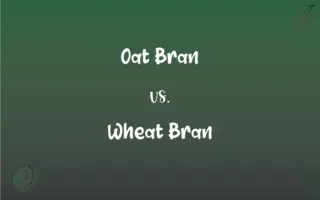Quantum Mechanics vs. Classical Mechanics: What's the Difference?
Edited by Aimie Carlson || By Janet White || Published on February 9, 2024
Quantum mechanics deals with subatomic particles and their probabilistic behavior, while classical mechanics describes the motion of macroscopic objects under forces.

Key Differences
Quantum mechanics is a fundamental theory in physics that describes nature at the smallest scales, like atoms and subatomic particles. Classical mechanics, on the other hand, deals with the motion of larger, macroscopic objects and is based on Newton's laws of motion.
In quantum mechanics, the behavior of particles is inherently probabilistic, with principles like uncertainty and wave-particle duality. Classical mechanics operates under deterministic laws, where future behavior can be predicted from current conditions.
Quantum mechanics introduces concepts like superposition and entanglement, which have no counterparts in classical mechanics. Classical mechanics, conversely, applies to everyday experiences and engineering applications, unlike the often counterintuitive nature of quantum mechanics.
Quantum mechanics is essential for understanding the fundamental aspects of the universe, while classical mechanics is practical and sufficient for describing most everyday phenomena, like the motion of vehicles or planetary orbits.
Comparison Chart
Scale of Application
Subatomic particles
Macroscopic objects
ADVERTISEMENT
Behavioral Model
Probabilistic and non-deterministic
Deterministic
Fundamental Concepts
Superposition, entanglement, wave-particle duality
Newton's laws of motion, force, mass
Predictability
Inherently uncertain
Predictable based on current conditions
Practical Application
Essential in modern technology, like semiconductors
Applied in everyday phenomena, like vehicle motion
Quantum Mechanics and Classical Mechanics Definitions
Quantum Mechanics
Characterized by the probabilistic nature of particle behavior.
In quantum mechanics, the exact position of a particle is not determinable.
ADVERTISEMENT
Classical Mechanics
Describes the relationship between motion and forces.
Engineers use classical mechanics to design bridges and vehicles.
Quantum Mechanics
Quantum mechanics introduces the concept of entanglement, where particles become correlated in a way that their properties are interconnected.
Quantum entanglement is a fundamental phenomenon in quantum mechanics that challenges classical intuitions.
Classical Mechanics
A branch of physics focusing on the motion of macroscopic objects.
Classical mechanics explains how planets orbit the sun.
Quantum Mechanics
Introduces principles like wave-particle duality and superposition.
Quantum mechanics suggests particles can be in multiple states simultaneously.
Classical Mechanics
Governed by Newton's laws of motion.
The trajectory of a thrown ball can be predicted using classical mechanics.
Quantum Mechanics
A branch of physics dealing with the behavior of subatomic particles.
Quantum mechanics explains the behavior of electrons in an atom.
Classical Mechanics
Applies to everyday experiences and engineering problems.
Classical mechanics is used to calculate the forces acting on structures.
Quantum Mechanics
Fundamental for understanding molecular and atomic interactions.
Quantum mechanics is crucial in the field of quantum chemistry.
Classical Mechanics
Classical mechanics treats objects as point masses and simplifies complex systems for practical analysis.
Modeling a swinging pendulum as a simple harmonic oscillator is an approach in classical mechanics.
FAQs
Is quantum mechanics deterministic?
No, it's inherently probabilistic and non-deterministic.
What are the key features of classical mechanics?
It's based on Newton's laws and deals with the motion of physical objects.
Can classical mechanics predict the behavior of planets?
Yes, it's used to predict planetary motion and orbits.
Do quantum mechanics principles apply to everyday life?
They're not noticeable in everyday life but underpin modern technology.
Are Newton's laws part of quantum mechanics?
No, they're a fundamental part of classical mechanics.
Does classical mechanics apply to very high speeds?
No, relativistic mechanics is used for speeds close to the speed of light.
What is quantum mechanics?
A branch of physics that studies subatomic particles and their interactions.
How does quantum mechanics affect computing?
It's the basis for developing quantum computing.
How do quantum mechanics and classical mechanics differ in scale?
Quantum mechanics applies to the subatomic level, while classical mechanics applies to macroscopic scales.
Are classical mechanics principles used in architecture?
Yes, for structural analysis and design.
What's an example of quantum mechanics in technology?
It's essential in the functioning of semiconductors and lasers.
Can quantum mechanics explain gravity?
It explains fundamental forces, but integrating gravity is a complex challenge.
Can classical mechanics describe the behavior of atoms?
No, atomic behavior is explained by quantum mechanics.
Is quantum mechanics used in chemistry?
Yes, particularly in quantum chemistry for molecular interactions.
Are the concepts of force and mass relevant in quantum mechanics?
They are more central to classical mechanics.
Is energy quantized in classical mechanics?
No, this concept is unique to quantum mechanics.
How does quantum mechanics impact our understanding of the universe?
It provides a fundamental understanding of atomic and subatomic processes.
Can quantum mechanics predict exact outcomes?
It predicts probabilities, not exact outcomes.
Is the uncertainty principle part of classical mechanics?
No, it's a key concept in quantum mechanics.
Is classical mechanics still relevant today?
Yes, especially in engineering and everyday physical calculations.
About Author
Written by
Janet WhiteJanet White has been an esteemed writer and blogger for Difference Wiki. Holding a Master's degree in Science and Medical Journalism from the prestigious Boston University, she has consistently demonstrated her expertise and passion for her field. When she's not immersed in her work, Janet relishes her time exercising, delving into a good book, and cherishing moments with friends and family.
Edited by
Aimie CarlsonAimie Carlson, holding a master's degree in English literature, is a fervent English language enthusiast. She lends her writing talents to Difference Wiki, a prominent website that specializes in comparisons, offering readers insightful analyses that both captivate and inform.







































































